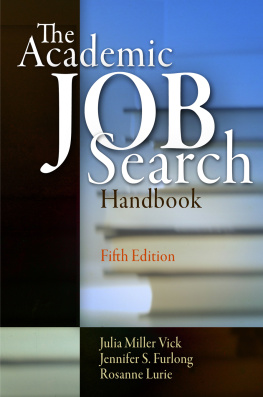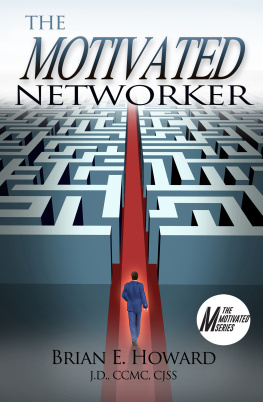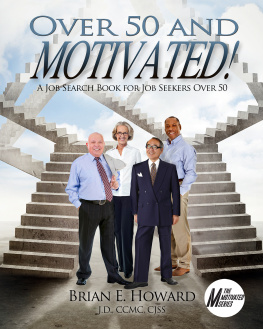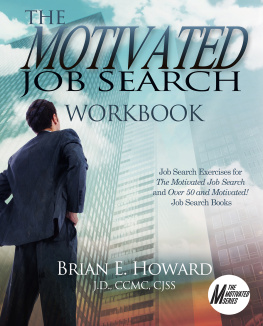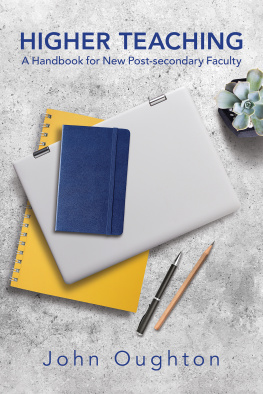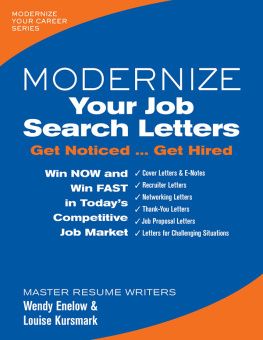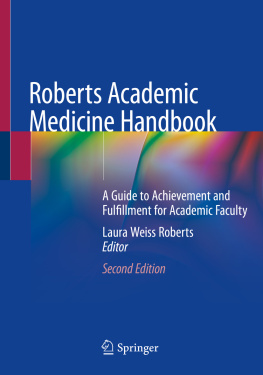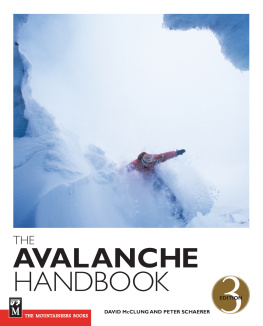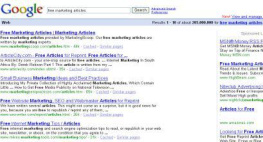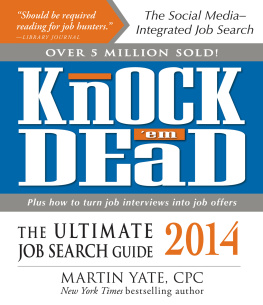Furlong Jennifer S. - The academic job search handbook
Here you can read online Furlong Jennifer S. - The academic job search handbook full text of the book (entire story) in english for free. Download pdf and epub, get meaning, cover and reviews about this ebook. City: United States., year: 2016, publisher: University of Pennsylvania Press, genre: Home and family. Description of the work, (preface) as well as reviews are available. Best literature library LitArk.com created for fans of good reading and offers a wide selection of genres:
Romance novel
Science fiction
Adventure
Detective
Science
History
Home and family
Prose
Art
Politics
Computer
Non-fiction
Religion
Business
Children
Humor
Choose a favorite category and find really read worthwhile books. Enjoy immersion in the world of imagination, feel the emotions of the characters or learn something new for yourself, make an fascinating discovery.
- Book:The academic job search handbook
- Author:
- Publisher:University of Pennsylvania Press
- Genre:
- Year:2016
- City:United States.
- Rating:3 / 5
- Favourites:Add to favourites
- Your mark:
- 60
- 1
- 2
- 3
- 4
- 5
The academic job search handbook: summary, description and annotation
We offer to read an annotation, description, summary or preface (depends on what the author of the book "The academic job search handbook" wrote himself). If you haven't found the necessary information about the book — write in the comments, we will try to find it.
The academic job search handbook — read online for free the complete book (whole text) full work
Below is the text of the book, divided by pages. System saving the place of the last page read, allows you to conveniently read the book "The academic job search handbook" online for free, without having to search again every time where you left off. Put a bookmark, and you can go to the page where you finished reading at any time.
Font size:
Interval:
Bookmark:

The Academic Job Search Handbook
Fifth Edition
The Academic Job Search Handbook
Fifth Edition
Julia Miller Vick
Jennifer S. Furlong
Rosanne Lurie
PENN
University of Pennsylvania Press
Philadelphia
Copyright 2016 Julia Miller Vick, Jennifer S. Furlong, and Rosanne Lurie
Copyright 2008 Julia Miller Vick and Jennifer S. Furlong
Copyright 1992, 1996, 2001 Mary Morris Heiberger and Julia Miller Vick
All rights reserved. Except for brief quotations used for purposes of review or scholarly citation, none of this book may be reproduced in any form by any means without written permission from the publisher.
Published by
University of Pennsylvania Press
Philadelphia, Pennsylvania 19104-4112
www.upenn.edu/pennpress
Printed in the United States of America on acid-free paper
10 9 8 7 6 5 4 3 2 1
Library of Congress Cataloging-in-Publication Data
ISBN 978-0-8122-2340-8
Contents
Acknowledgments
This fifth edition of the Academic Job Search Handbook rests on the contributions of all those who have been mentioned in the Acknowledgments of the first four editions. This edition builds on the previous work of the late Mary Morris Heiberger and adds the voice of new coauthor Rosanne Lurie.
We are grateful to all past and current contributorsdoctoral students, alumni, postdoctoral fellows, faculty, and administratorswho provided insight and ideas, a reading of the manuscript, or actual job hunting materials. We are grateful to the faculty from many colleges and universities, particularly the University of Pennsylvania and, now, the Graduate Center, City University of New York, who have shared their insight and experience at programs we have organized for graduate students and postdocs. It is impossible to thank them all individually, but we are well aware that but for them this book could not exist. Graduate students, postdocs, graduate alumni, and junior faculty members have discussed their own job searches with us; they have broadened our awareness of the range of what may happen and increased our ability to predict what is likely to happen.
We owe a great debt to our colleagues in the Graduate Career Consortium. For more than a quarter of a century, the GCC has been the professional network of staff and administrators who provide professional and career development for Ph.D.s and postdoctoral scholars at their universities and institutions. We are grateful to this most supportive group that shares ideas and problems as we work to best help doctoral students and postdocs and, for this edition, particularly appreciate the help of Gwynn Laird Benner, Rachel Bernard, Victoria Blodgett, Melissa Bostrum, Neal Bryan, Eileen Callahan, Elizabeth Edwards, Chris Golde, Christine Kelly, Julia McAnnelen, Molly McCarthy, Amy Pszczolkowski, Briana Randall, Ruth Schemmer, Melanie Sinche, Molly Starbuck, Laura Stark, and Kate Stober.
At Penn we appreciate the help and support of Andrew Binns, Susan Weiss, Bob Schoenberg, MaryBeth Gasman, and Mitch Fraas. Colleagues at Career Services have been consistently supportive, particularly J. Michael DeAngelis, who handled all our technical problems with his usual aplomb. We feel fortunate that Patricia Rose, director, has been uniformly enthusiastic about and supportive of this project since its inception in the early 1990s.
At the City University of New York and particularly at the Graduate Center, the support of Chase Robinson, Louise Lennihan, Matthew Schoengood, Joe Straus, David Humphries, and Flannery Amdahl has been invaluable.
We appreciate the support of our respective spouses, Jim Vick, Kris Johnson, and Dave Rosenthal, as we worked at each others homes and held many weekend conference calls. Special thanks go to little Camille Elizabeth Johnson, whose punctuality in being born enabled her mother to put final touches on the manuscript!
It has been a pleasure to work with the staff at the University of Pennsylvania Press. They have been involved with this book since publishing the first edition in 1992.
As always, we are particularly grateful to the graduate students, alumni, postdocs and faculty members from institutions all over the country who shared their sample job-hunting materials and/or their narratives with us. Because we promised them anonymity, we cannot thank them here by name. However, their generosity has provided what many will find to be the most useful part of this book.
Introduction to the Fifth Edition
Why is there a need for a fifth edition of the Academic Job Search Handbook? The goal has always been to be a helpful guide to what can sometimes be an opaque process, and over the years many people have told us they find the book to be invaluable in figuring out how to conduct the job search. However, since the previous edition was published in 2008, major shifts in both higher education and the global economy have affected the academic job market. The recession served as a catalyst for changes in higher education that are probably here to stay, even as the economy continues to improve. Our intent is not to critique these changes but to provide a basic context for them and support for those conducting an academic job search in a challenging climate.
Over the past several years we have seen that more and more institutions are finding it advantageous to establish and develop career services specifically targeted to doctoral students and postdocs. In a sea change, academic departments are thinking more about how to do that and proactively working to help their students have success after graduationeven if they pursue non-faculty careers. In addition to departmental efforts, institutions too are wondering what they can do. The huge growth of the Graduate Career Consortium, the national association for career advisors who work with doctoral students and postdocs, is a strong indicator of increased institutional concern over career outcomes of doctoral students and desire for competitive advantage in the national conversation about career outcomes for students at all levels.
Technology did not change dramatically in the period between the third and fourth editions. However, since 2008 the speed of technological change has accelerated and transformed the way people do research and scholarship, the way they connect about research and scholarship, the skills graduate students are expected to learn, and the online presence they need to build and maintain. Since these modalities are new all the rules are evolvingparticularly for young scholars.
Most colleges and universities want the student population and faculty body to reflect the national as well as global population. As there is great effort to accept more underrepresented minority students, students who are the first in their family to go college, and international students, and as technology impacts every aspect of scholarly and pedagogical life, it becomes important for job candidates to be more than an expert on their subject. It is necessary to bring a wider range of attributes and an interest in doing more than simply teaching your topic and doing your research. Mastering teaching with technology, engaging in service, developing a new major or even degree program, and grant writing are some tasks junior faculty may be expected to do as soon as they begin their new position; previously these things were not usually asked of them so early in their career.
In this edition we expand the discussion of what you need to be a strong candidate and include more than 60 new sample job search materials, including the complete packet of materials of one candidate. These sample materials are from real candidates in humanities, social sciences, STEM (Science, Technology, Engineering, Math), professional disciplines, and arts who secured positions in their fields. As you will see, there is not one way to write any of these materials. Rather they reflect each candidates unique background. With these we include helpful comments and guidance. , Knowing About and Getting Tenure, now discusses the community college tenure process, as well as the processes at a research university and a liberal arts college. Because so many faculty job candidates are part of a couple and/or are interested in becoming parents weve added new personal narratives on those topics.
Next pageFont size:
Interval:
Bookmark:
Similar books «The academic job search handbook»
Look at similar books to The academic job search handbook. We have selected literature similar in name and meaning in the hope of providing readers with more options to find new, interesting, not yet read works.
Discussion, reviews of the book The academic job search handbook and just readers' own opinions. Leave your comments, write what you think about the work, its meaning or the main characters. Specify what exactly you liked and what you didn't like, and why you think so.

